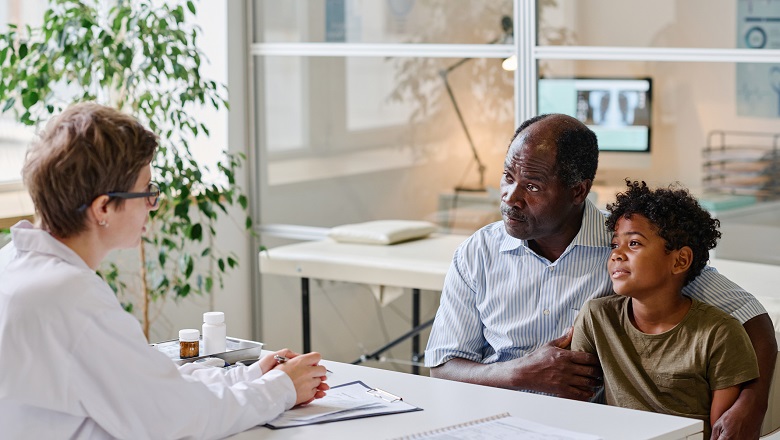
Dr Philip Shaw announced as new Director of King’s Maudsley Partnership for Children and Young People

We are delighted to announce Dr Philip Shaw as the new Director of the King’s Maudsley Partnership for Children and Young People, taking up the role from October 2024. Based in South London at the Pears Maudsley Centre for Children and Young People, the work will benefit local communities with impact and collaborations nationally and globally. Dr Shaw was part of an interview process that included input from a panel of young people.
The issue of children and young people’s mental health is one of the most significant health and societal challenges today. Long waiting lists for mental health services cause long term impacts on children, young people, and their families, so early identification and intervention is key to seeing long term benefits. The ultimate driving force behind our Partnership is a desire to enable future generations of children to enter adulthood leading happier, healthier lives.
“I am thrilled to be joining the Partnership next year and to have the opportunity to lead a centre of such significance and potential. I look forward immensely to working with research and clinical colleagues and those who receive care at the Pears Maudsley Centre, their families and the local community. As a psychiatrist working with children and families in the clinic as well as having researched ADHD for many years, the chance to investigate, develop and offer new, and potentially life-changing interventions for young people is the driving force behind my work. By bringing together young people, their families, clinicians and researchers, we aim to gain a deeper understanding of challenges to mental health, and to provide innovative, effective new treatments and approaches to care.”
A member of both the Royal College of Physicians and the Royal College of Psychiatrists, Dr Philip Shaw is currently a Senior Investigator at the Neurobehavioral Clinical Research Section of the National Human Genome Research Institute, part of the National Institutes of Health (NIH) in the United States. His key interest is in the genetic and environmental factors that influence the development of brain and behaviour, focusing on attention deficit hyperactivity disorder.
He is both a researcher and a clinician who works with families to translate neural and genomic discoveries into tools that can help predict the likely adult outcomes of childhood ADHD. His group is also developing novel treatments, delivered in virtual reality, that respond to a young person’s individual profile of cognitive strengths and challenges.
“Dr Philip Shaw is uniquely placed to draw on and bring to the partnership his experience enabling scientific and clinical communities to collaborate to catalyse breakthroughs and support the study and treatment of children and young people’s mental health and neurological disorders. As a former alumnus of King’s it is heartening that he is returning to undertake such a crucial role in children and young people’s mental health here.”
Dr Shaw trained as a psychiatrist at the Maudsley, has been a lecturer at the Institute of Psychiatry, Psychology & Neuroscience (IoPPN) and completed a fellowship in child and adolescent psychiatry at the New Childrens’ Hospital in Sydney, Australia. He has degrees in experimental psychology and medicine from Oxford University and received a Ph.D. in psychological medicine from the former Institute of Psychiatry, now IoPPN, King’s College London.
“I am delighted that Dr Philip Shaw is joining the King’s Maudsley Partnership. Through Dr Shaw’s vision and expertise, and with the support from philanthropists and the public we can improve mental health outcomes for young people and their families now and for the future – the Pears Maudsley Centre is the physical embodiment of that vision.”
The King’s Maudsley Partnership is a unique partnership between South London and Maudsley NHS Foundation Trust and King’s College London’s Institute of Psychiatry, Psychology & Neuroscience, with Maudsley Charity as its charity partner, that will see researchers and clinicians working more closely together to find new ways to predict, prevent and treat mental health disorders for children and young people, and maximise translation of research and evidence into improved services, locally but also nationally and globally.
It will have its home at the new Pears Maudsley Centre for Children and Young People, a £70m purpose-built centre that will include an in-patient adolescent unit, and a child and family friendly research facility with cutting-edge imaging methods, virtual reality and a digital lab. The centre has been designed with input from young people and their families alongside clinicians and researchers to provide a welcoming and therapeutic environment conducive to clinical research and clinical excellence.
“We are looking forward to welcoming Dr Phillip Shaw. As a psychiatrist with incredible clinical and research experience he is uniquely placed to help realise the vision of the partnership. The work of the partnership, based in the Pears Maudsley Centre for Children and Young People, will transform knowledge and understanding of young people’s mental health and reduce the time it takes to bring new treatment to patients that can improve their lives.”
The new Pears Maudsley Centre for Children and Young People is set to open in 2024 and will provide world-leading mental health support to young people. This collaboration between the IoPPN, South London and Maudsley NHS Foundation Trust, and Maudsley Charity will transform the treatment and care of children and young people in the UK and across the globe.
Categories
Follow Us
For the latest updates and news, follow us on our social channels.












Recent Comments